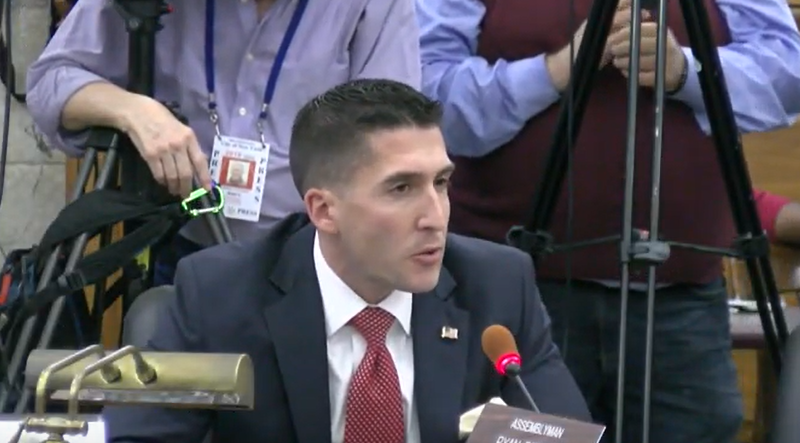Battleground Assemblyman Ryan Peters Announces NJEDA Tax Incentive Reform Bill Package
Listen to audio version of this article

Assemblyman Ryan Peters announced a package of reforms aimed to protect taxpayers from corporate tax incentive fraud and to prevent backroom deals within the Economic Development Authority.
“Recently, we’ve witnessed the unearthing of hidden influence and rampant abuse within the Economic Development Authority and how it doles out billions of dollars in tax incentives,” said Peters (R-Burlington). “We need to turn a spotlight on the process and put greater controls in place to hold accountable the elected officials, lobbyists and businesses that benefit from our tax-incentive programs.”
The four-bill package looks to make changes to New Jersey’s embattled Economic Development Authority by introducing Inspector General and Auditor roles that will be in charge of monitoring the multi-billion dollar tax-incentive program. It will also defend against undisclosed influence in the program by closing loopholes on lobbying laws.
“New Jersey’s highest-in-the-nation tax and regulation structure has created an awful climate for businesses that has been well documented in the press. Without these immensely important tax incentive programs, this state will lose any level of competitiveness it has left,” Peters said.
“It’s absolutely critical we extend these programs, but if the system behind them is broken, it’s just as dangerous continuing with them as is. If the Democrat-controlled legislature is unwilling to lower tax rates on our businesses, then we need these changes to save our tax incentive programs while earning back the public trust,” he continued.
The proposed package would lower the threshold for reporting activity as a lobbyist from 20 hours in a calendar year to one hour. It would also establish a “Local Government Process Activities Disclosure Act,” by expanding lobbying disclosure requirements to a local level.
“The root cause of the tax incentive debacle was the lack of disclosure of lobbying activities and, as a result, the exploitation of state tax dollars,” Peters said.
The EDA reform package would also establish the Office of the Economic Development Inspector General within the Economic Development Authority and establish the position of Economic Development Auditor within the office. The Inspector General would report annually to the governor the activities of the EDA, while the Auditor would evaluate the validity of an applicant’s claim to tax incentives in terms of areas such as job creation and moving out of state.
“Oversight, accountability and greater disclosure are needed to make our critical tax incentive programs work,” said Peters. “I’m calling on the legislature to come back in session so this package can be introduced and we can move forward with fixing this broken system.”
Below is a summary of the proposals:
Appointed EDA Inspector General
Establishes the Office of Economic Development Inspector General within the Economic Development Authority (EDA). The proposal provides broad powers to the office to monitor, investigate and report on the agencies’ activities. The Inspector General shall be appointed by the Governor and affirmed by the Senate.
Appointed EDA Auditor
Establishes the position of Economic Development Auditor within EDA. This position is appointed by the Inspector General and will review and evaluate records of entities and individuals doing business with or receiving economic development incentives from the EDA. The Auditor shall review applicant claims, such as job creation and retention, and the validity of the applicant’s decision to move out of state.
Lobbying Loophole Proposal 1
Under current law, a “government affairs agent” is a person who receives compensation to influence legislation or regulations by communicating with an elected state official for more than 20 hours in a calendar year. The proposal redefines the definition of “governmental affairs agent” to include those individuals performing activities for more than one hour in a calendar year.
Lobbying Loophole Proposal 2
Establishes the Local Government Process Activities Disclosure Act, requiring local activities that influence government process beyond one hour to be registered and disclosed with the Election Law Enforcement Commission. The act shall follow the same requirements as the state governing body lobbying laws.
19-5362
19-5364
N04_0056
N04_0057










Leave a Reply